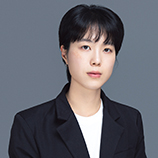 Jeon Seo-ah
Jeon Seo-ah2016~ Project Haja PlaywrightㆍDirector
2014 Dept. of Theatre, Chung-Ang University, School of Performing Arts and Media
PlaywrightㆍDirector
2025 <Cheongsong>, <Mystery Girls Club>, <Curtain>
2024 <Curtain>
2023 <240 245>, <Muru is Over There>
2022 <240 245>
2021 <Curtain>
2020 <The Mermaid>
2019 <Hello 2>
2018 <The Peaceful Mansion on the Hill>, <One There Once Was But Not Anymore>
2017 <The Disremembered>
2016 <The Disremembered>
Playwright
2023 <Secret Garden>, <The Peaceful Mansion on the Hill>
2021 <240 245>, <The Peaceful Mansion on the Hill>
2017 <Hello>
Exhibition CuratorㆍDirector
2021 Interactive Exhibition <Women, Bodies, Shame, Disconnection and Connection>
2019 4th Chemical Reaction Festival : Interactive Exhibition <Dust Can Do Anything>

Jury’s Statement
The jury for the 16th DOOSAN Yonkang Art Award has selected playwright and director Jeon Seo-ah as this year’s recipient.
As the playwright and director of Project Haja, Jeon Seo-ah has focused on staging the experiences, stories, and sensibilities of those at the margins of society, including women, queer individuals, and migrants. More than that, she experiments with a wide range of performance styles with hopes of securing broader public resonance. Since her debut The Disremembered (2016/2017), Jeon’s works have included Hello (2017), The Peaceful Mansion on the Hill (2018/2021/2023), Hello 2 (2019), 240 245 (2021/2022/2023), Curtain (2021/2024/2025), Muru is Over There (2023), and Secret Garden (2023), as well as participatory exhibition-performances such as Dust Can Do Anything (2019) and Women, Bodies, Shame, Disconnection and Connection (2021).
Jeon brings to the stage personal and intimate experiences—subjects that resist easy theatrical translation. For instance, The Peaceful Mansion on the Hill explores the wounds emerging from subtle differences between lesbian and bisexual identities, and Curtain probes the inner worlds of four women and the different textures of their sensibilities. Jeon’s originality, however, lies in her ability to transform these private memories, sensibilities, and experiences into a collective narrative about ‘all of us.’ Whispers and murmurs become echoes and roars on the stage. Her work explores the process of embodiment by posing small questions to the audience, inspiring them to engage those questions, and finally to ask those questions themselves. In Curtain, for example, what begins as individual monologues gradually builds into dialogue and, ultimately, expands to a conversation with the audience on women’s solidarity. In this way, Jeon’s theatre consistently traverses the personal and the public, the lived and the fictional, the real and the theatrical.
This distinct approach relates to a defining feature of her work, as she gives form to life’s moments that cannot be divided into binaries, ambiguous sensations that remain unnamed and uncategorized, situations that resist definition and have even less of a language built around them, manifesting them on stage through vivid imagery. Boundaries that seemed clear and self-evident expand into ‘spaces’ of new possibilities as she continues to explore them. For instance, 240 245 is a play that builds on an interview with Park Eunho, an actor and ‘boundary-dweller’ who grew up in China but works in Korea. This piece vividly portrays the disorienting experience of someone caught between being Chinese and Korean, homosexual and heterosexual, an acknowledged actor and an unrecognized artist, and draws urgent attention to those who dwell on boundaries.
Both playwright and director, Jeon’s strength is marked by the new model of performance she proposes, one that operates on shared authorship with her contemporaries. Jeon often re-stages her works under altered credits. By doing so, she refuses to monopolize productions and instead extends them into collective undertakings. For example, the premiere (2018) of The Peaceful Mansion on the Hill was written and directed by Jeon herself, but the second run (2021) was directed by Shim Jihoo, and the third run (2023) by Kang Yoonji. In the case of 240 245, the premiere was written by Jeon and directed by Park Eunho, while the second run was directed by Jeon herself. Through this process, Jeon was able to protect the personal experiences and stories of her collaborator, Park Eunho, while simultaneously extending them into the public realm.
Jeon is a vital presence in the Korean theatre world, where playwrights with a deep understanding of the stage are rare. She is not roped into writing s that may be literally adept but remain ambiguous as stage writing. Instead, the strength of her writing grounds stories driven from everyday experiences, and her wit and humor present them on stage as performances that deeply engage audiences. That said, Jeon must also grapple with a recurring pitfall in recent works dealing with minority or marginal lives—the risk of reducing the exposure of productions to niche audiences in the pursuit of authenticity, or overlooking the problem of subjectivity in these authentic experiences themselves. We encourage Jeon not to rely solely on the urgency of her subject matter for validation, but to engage with equal rigor the artistic and theatrical forms that embody those concerns. If she is to respond to the weighty public responsibilities of the stage, she must continue to contemplate and experiment with ways to expand such subjectivity to a universal message. Trusting that she will continue to rise to such challenges, the jury of the 16th DOOSAN Yonkang Art Award wholeheartedly supports Jeon’s future endeavors.
The jury for the 16th DOOSAN Yonkang Art Award Brochure download(click)